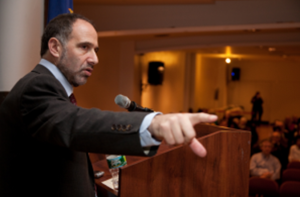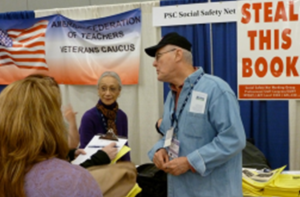In the wake of the Great Recession of 2008-2009, attacks against Social Security, public sector pensions, Medicare and other social safety net programs have escalated — all part of an ominous political thrust to shift the burden of the municipal, state and federal budget crises to  working families and the poor.
working families and the poor.
The attacks on these programs constitute a major threat to the wellbeing of the next generations of American workers, as well as to those currently depending on retirement, survivor or medical benefits.
In response, the Retirees’ Chapter in October 2010 formed a Social Safety Net Working Group. At its February 2011 meeting, the PSC Executive Council voted to expand what started out as a chapter initiative into a union-wide campaign.
The primary purpose of the campaign was to:
- Educate our own members, especially younger in-service members, about the issues.
- Set the record straight about these programs by dispelling the misinformation used to undermine support for them.
- Join larger coalitions already formed in defense of the social safety net.
The group, initially consisting of nine retirees, has met regularly to review literature on safety net programs and to develop resources on three areas in particular to be used in an educational campaign:
- Retirement Insecurity: Pensions and Social Security
- Healthcare: Medicare and Medicaid
- Putting Food on the Table: Food Stamps and Unemployment Insurance
The group’s first task was to draft a short, plain-spoken booklet explaining the programs and why their support is crucial. Its second was to plan a major forum.
The brochure, entitled “DEFENDING THE SOCIAL SAFETY NET: A CALL TO ACTION,” was revised and expanded in 2014, then again in 2015, and is available in hard copy and online.

Dean Baker, the keynote speaker at the 10/25/11 forum.
The forum took place on Oct. 25, 2011 at the Hospital Workers/1199 auditorium. An enthusiastic audience of about 200 people, young and older PSC members, students, and representatives of other unions and advocacy groups, filled the hall. The keynote speaker was the economist Dean Baker, co-director of the Center for Economic & Policy Analysis.
Baker was followed by Kimberly Phillips-Fein of NYU, who spoke on the attack on Social Security. After that, James Parrott of the Fiscal Policy Institute discussed the state budget context, and Frances Fox Piven concluded the event with a call to action.

Safety Net team members Cecelia McCall and John Hyland distributing brochures at NYSUT RA, April 2012.
A follow-up forum “The Safety Net, Sequestration & Austerity Politics” took place on April 8, 2013. The event addressed proposed cuts to Social Security, emphasizing the need to defend the social safety net amid rising poverty and homelessness in New York City. Speakers included experts from various organizations who discussed economic disparities and urged action against austerity measures. The forum aimed to mobilize support for preserving essential programs that support vulnerable populations. Click here for Clarion coverage of the event.
Along with the forums and the brochure, members of the working group visited PSC chapters to present and discuss important information on Social Security, Medicare, Medicaid, and pensions. These activities were motivated by a desire to interest and engage the whole union, both in-service and retiree members, in this important project.
With the boost of a $25,000 grant from PSC’s state affiliate, the New York State United Teachers (NYSUT), the Group has extended its reach to a statewide audience of trade unionists, educators and community groups. The grant funded the creation of new materials and workshops and a major revision of the working group’s existing brochure DEFENDING THE SOCIAL SAFETY NET: A CALL TO ACTION. The booklet is a key part of a toolkit used as a resource for workshops whose aim is to motivate activism locally, inside NYSUT and with union, community and social justice partners across the state.

